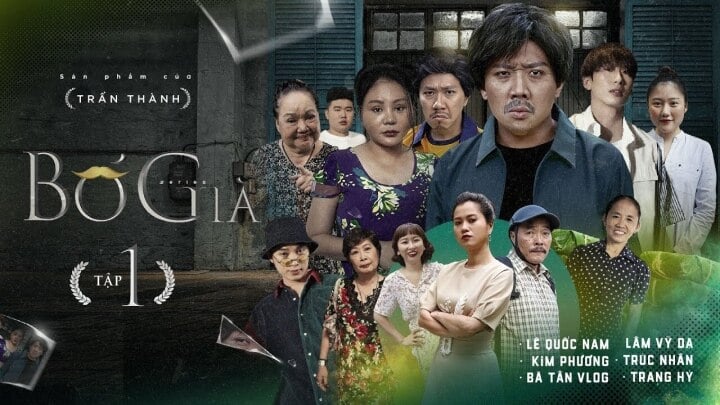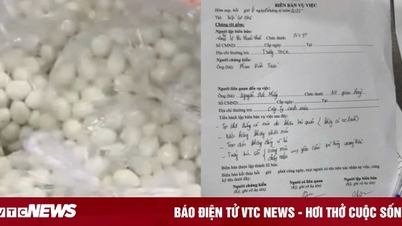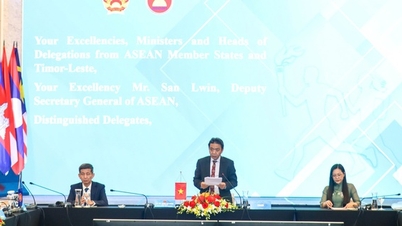Recently, with the development of the Internet and social networking platforms, especially YouTube, web dramas have appeared more and more. Because they can reach a large audience anywhere, and have the ability to make good money from advertising without having to go through strict content censorship, not only celebrities but also amateur producers have invested in making web dramas, but the quality is uneven.

Tran Thanh's web drama 'Bo Gia' once took the internet by storm.
Many famous names such as Tran Thanh , Thu Trang, Huynh Lap have invested in producing many large web dramas with a huge number of views, creating a phenomenon on social networks. Many web dramas have even become a source of inspiration for major movies released in theaters such as Bo Gia, Chi Muoi Ba... However, on the current YouTube platform, it is almost completely abandoned, with bad and toxic content rampant.
While theatrical films are censored according to the Cinema Law, images and content that violate prohibitions must be cut out, clearly classified, and even not distributed, online films contain a lot of offensive content, easy images, and most of them are not classified or labeled with warnings according to the provisions of the newly issued Cinema Law 2022.

Offensive hot scenes without warning appear everywhere on online movies.
Point d, Article 21 of the 2022 Cinema Law on "Dissemination of films on cyberspace" clearly stipulates: "Before disseminating films on cyberspace, it is necessary to ensure the conditions for film classification according to Government regulations and be responsible before the law for the content and results of film classification; in case the conditions for film classification are not yet ensured, it is requested that the Ministry of Culture, Sports and Tourism or an agency authorized by the Ministry classify films that have not been granted a film classification license or a broadcasting decision."
However, viewers of all ages can still access web dramas with 18+ images, content that violates prohibitions in the Cinema Law, even violates the law without any warning. With easy access to the Internet today, this is a great danger to the audience, especially children, if they can watch this content without adult supervision. Meanwhile, to attract views, many web dramas often use offensive hot scenes, even scenes of gangsters killing each other to attract attention.
Regarding this issue, Director of the Department of Cinema Vi Kien Thanh shared with VietNamNet that the Department is reporting to the leaders of the Ministry of Culture, Sports and Tourism on this issue and proposing a solution to deal with online films. "The important thing is that Article 3 of the Cinema Law defines what is a film and what is not a film. The Ministry of Culture, Sports and Tourism only manages the content of films, while the content of web dramas is managed by the Ministry of Information and Communications and the Ministry of Public Security , using the Law on Cyber Security as a basis. We recently reported to the leaders of the Ministry on this issue, on the actual situation and clearly defined the responsibilities of the parties."

Management agencies need to closely monitor to avoid the situation where movies shown in theaters are strictly controlled while movies shown online are freely available.
The head of the Department of Cinema said that he has proposed a discussion between the Ministry of Culture, Sports and Tourism and the Ministry of Information and Communications to clearly define the responsibility for managing content on cyberspace because the Ministry of Culture, Sports and Tourism only manages films.
When asked about the difficulties of the management agency when monitoring film content on the internet in the form of post-audit, often handling situations on a case-by-case basis, Mr. Vi Kien Thanh said that there are many difficulties related to films when the Department of Cinema does not have the technical equipment and infrastructure to manage. In addition, the Department has only added 1 staff to monitor this. "There are still inadequacies between the wishes of the management agency and reality, it is not simple," he said.
According to him, although online movies have been clearly regulated in the Cinema Law on self-classification and labeling by producers, the management agency only conducts post-inspection, but currently it can only conduct surprise inspections and cannot check all so-called movies posted online. The management agency cannot review all the movies posted online to see if they have classified them correctly and if there are any violations in order to request their removal.
Article 21 of the 2022 Cinema Law on 'Dissemination of films on cyberspace'
1. The entities permitted to disseminate films on cyberspace are enterprises, public service units, and organizations that carry out film dissemination activities according to the provisions of this law and other relevant legal provisions.
2. The subject of disseminating films on cyberspace as prescribed in Clause 1 of this Article must ensure the performance of the obligations prescribed in Points c and d, Clause 2, Article 18, other relevant legal provisions and the following provisions:
a) Films that violate the provisions of Article 9 and other relevant legal provisions must not be disseminated;
b) Before disseminating films on cyberspace, it is necessary to ensure the conditions for film classification according to Government regulations and be responsible before the law for the content and results of film classification; in case the conditions for film classification are not yet ensured, it is necessary to request the Ministry of Culture, Sports and Tourism or an agency authorized by the Ministry to classify films that have not been granted a film classification license or a broadcasting decision according to the order and procedures prescribed in Clauses 3 and 4, Article 27 of this Law;
c) Notify the list of films to be disseminated and the film classification results to the Ministry of Culture, Sports and Tourism before disseminating films on cyberspace;
d) Implement necessary technical measures and provide guidance for parents or guardians of children to self-control, manage and ensure that children watch popular movies on the internet that are appropriate for their age; and for service users to report movies that violate the provisions of this law;
d) Provide focal points and contact information to receive and process requests from state management agencies; feedback, complaints and denunciations from service users;
e) Remove films that violate the provisions of Article 9 and other relevant legal provisions upon written request from a competent state agency.
3. Organizations and businesses with digital media platforms to disseminate films in Vietnam have the following responsibilities:
a) Deploy technical solutions and coordinate with competent state management agencies to remove and prevent infringing films;
b) Ensure performance of obligations specified in Point a and Point d, Clause 2 of this Article.
4. Organizations and enterprises with telecommunications networks are responsible for preventing access to infringing films at the request of competent state agencies.
5. The Ministry of Culture, Sports and Tourism shall organize human resources and technical means to inspect film content, classify and display film classification results popularly on cyberspace; coordinate with the Ministry of Information and Communications, the Ministry of Public Security and relevant state management agencies to implement measures to prevent and handle violations of law provisions.
6. The Government shall detail points b, c, d and dd, Clause 2, point a, Clause 3 and Clause 4 of this Article.
(Source: Vietnamnet)
Useful
Emotion
Creative
Unique
Wrath
Source


![[Photo] General Secretary To Lam attends the 18th Hanoi Party Congress, term 2025-2030](https://vphoto.vietnam.vn/thumb/1200x675/vietnam/resource/IMAGE/2025/10/16/1760581023342_cover-0367-jpg.webp)

![[Photo] Nhan Dan Newspaper launches “Fatherland in the Heart: The Concert Film”](https://vphoto.vietnam.vn/thumb/1200x675/vietnam/resource/IMAGE/2025/10/16/1760622132545_thiet-ke-chua-co-ten-36-png.webp)































![[Video] TripAdvisor honors many famous attractions of Ninh Binh](https://vphoto.vietnam.vn/thumb/402x226/vietnam/resource/IMAGE/2025/10/16/1760574721908_vinh-danh-ninh-binh-7368-jpg.webp)




























![[Photo] Nhan Dan Newspaper launches “Fatherland in the Heart: The Concert Film”](https://vphoto.vietnam.vn/thumb/402x226/vietnam/resource/IMAGE/2025/10/16/1760622132545_thiet-ke-chua-co-ten-36-png.webp)






































Comment (0)